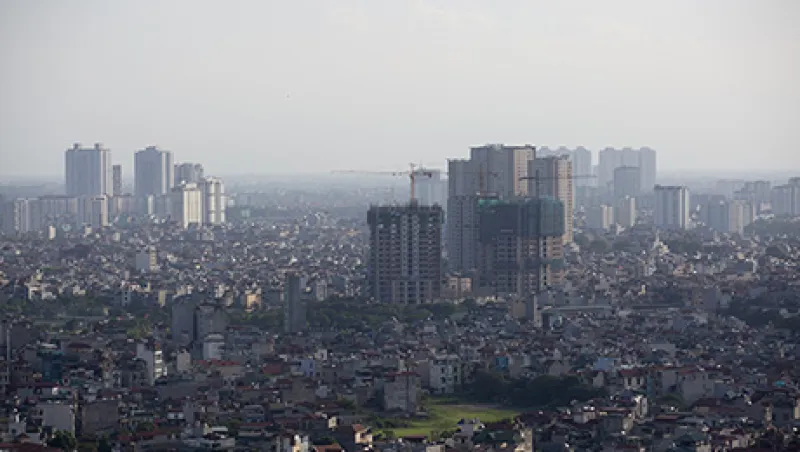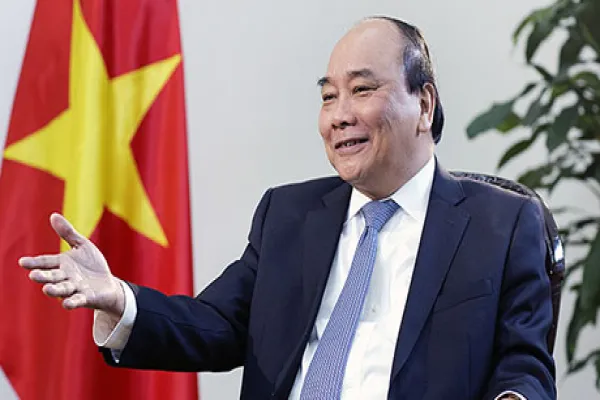Vietnam leaped onto investors’ radar screens last year when its chief stock exchange rose 20 percent, the best performance of any bourse in Southeast Asia. Foreign institutions were attracted by earnings growth among local blue-chip companies and the restoration of economic stability after a bout of inflation and currency weakness from 2008 to 2011.
Foreign money continues to flow in, but the tide is fast pressing up against the capacity limits of the 14-year-old Hochiminh Stock Exchange and the even tinier bourse in the capital of Hanoi. Investment managers are urging the country’s Communist government to take a number of measures, including opening the market wider to foreign investors, to sustain the momentum. Many are optimistic that the authorities will act soon.
“It’s a long-term process similar to what other Asian countries have done over 20 years,” says Bill Stoops, chief investment officer of Dragon Capital Group, a Ho Chi Minh City–based fund manager with $1.4 billion in assets under management. He expects the authorities to permit or encourage more company stock listings and the creation of pension funds and futures contracts.
Vietnamese officials are studying moves to let foreign institutions buy majority shares of local firms and to foster the creation of more domestic institutional investors, which would stoke trading volume in the notoriously illiquid market. In November 2013 the Finance Ministry said it planned to raise foreign ownership ceilings in local companies. Although officials haven’t made any announcements, fund managers predict the ceiling for most companies will rise from the current 49 percent to 60 percent in the first quarter of 2015. The limit for offshore investment in Vietnamese banks will go from 30 percent to 49 percent, state media say.
By 2016 the government is expected to create the country’s first public institutional investor, a retirement fund. Currently, the state social security system, the Viet Nam Social Security Fund, invests mostly in Treasury bills and bank deposits.
Foreign institutions, which already own an estimated 10 to 15 percent of the market, would eagerly buy shares in response to any of those changes, executives say. “An increasing number of fund managers are visiting Vietnam because they are searching for the next big investment story in Asia after the run-up in ASEAN emerging markets in the past few years,” says Marc Djandji, institutional sales and brokerage head at VPBank Securities in Ho Chi Minh City, referring to the Association of Southeast Asian Nations.
Growth has been running at a steady pace of roughly 5.25 to 6.25 percent for the past six years, and the International Monetary Funds projects output will expand by 5.6 percent this year. Inflation cooled to 6.6 percent last year after spiking to 18.7 percent in 2011, while the dong has held steady for the past 14 months at around 21,000 to the dollar. Foreign direct investment (FDI) rose 2.3 percent in the first seven months of this year, to $6.8 billion, notwithstanding a wave of anti-China riots in May that left several people dead and damaged scores of foreign-owned factories.
“Vietnam remains a beaming light in Asia, thanks to its extraordinary growth potential,” says Phuong Hoang, senior institutional research and investment advisory director with local brokerage and asset manager Saigon Securities. “The one-party power grip over the country has ensured macro stability, tamed inflation and [fostered] a very stable exchange rate, while FDI continues to flow into the manufacturing sector.”
Hanoi is pushing ahead with other reforms to underpin the economy and the market. The government is requiring state-owned companies, which account for some 32 percent of gross domestic product, to divest most noncore assets by next year in preparation for initial public offerings. To bolster the banking system and reduce nonperforming loans — which Moody’s Investors Service estimates at 15 percent of total assets in the system — the government has told state-owned bad debt buyer Vietnam Asset Management Co. to offer bonds that commercial banks can use as collateral for loans from the monetary authority. “State-owned enterprises and banking restructuring are under way and are expected to lead to an improved economic outlook and new investment opportunities,” says Hoang.
Foreign investors bought a net $280 million in the first half of this year on the Ho Chi Minh City exchange, up from $263 million in all of 2013. Funds from abroad have hit the 49 percent ownership cap in seven of the country’s 38 blue-chip companies, including telecom operator FPT Corp. and DHG Pharmaceutical Joint-Stock Co., suggesting there will be pent-up demand when the government lifts those ceilings, says Luong Thi My Hang, deputy CEO with VietFund Management, a Ho Chi Minh City firm that manages $95 million in assets.
Yet the market’s capacity remains limited. The stock market has a total capitalization of $55 billion, barely a third of the country’s $155 billion gross domestic product. Most investors look at just 30 to 50 of the 750 companies listed on the Ho Chi Minh City bourse. Many overlooked firms are state-controlled and have weak fundamentals. The 80 biggest listed state-controlled firms “are losing bucketloads and bucketloads of money,” says Ralf Matthaes, owner of the local business consultancy In-Focus.
Other factors also put a damper on the market. After some domestic companies lost money in real estate and stocks some five years ago, the government barred them from investing outside their core business, curbing a potential source of institutional investment. Vietnam also lacks a state pension plan with invested assets, an anchor in many Asian financial markets, but the government established guidelines last year to allow formation of private schemes. “Pension funds will make a huge difference,” says Kevin Snowball, chief executive officer with PXP Vietnam Asset Management, a Ho Chi Minh City firm with assets of $162 million. “There is no institutional base here to speak of.”
More investment by local institutions would raise liquidity from trading volumes that have averaged $150 million to $200 million a day over the past six months. “Private pension funds and the ETF industry have just been born this year,” notes Fiachra Mac Cana, research head at Ho Chi Minh City Securities Corp. “It will take several years to grow in size and become a factor in the equity market. I guess three to five years.”
Reflecting confidence in the market, VietFund launched a $9.5 million exchange-traded fund in August, the first from a local institution. The fund, VFMVN30, is designed to track the exchange’s blue-chip index, the VN30. VietFund is talking to the Viet Nam Social Security Fund’s pension scheme about working as its first external asset manager and expects feedback next year. Dragon Capital, VietFund’s parent company, is eyeing its year-old, $15 million Vietnam Equity UCITS Fund as a “template” for new open-ended funds, Dragon Capital’s Stoops says. Saigon Securities plans to offer a local open-ended fund and an ETF, whereas PXP will explore launching an ETF if it can get a local license.
The market also stands to get a boost from the government’s decision to create a state-run, centralized derivatives market in 2016. That market would add liquidity and allow hedging activities for the first time in Vietnam, says Stoops.
Get more on emerging markets.






